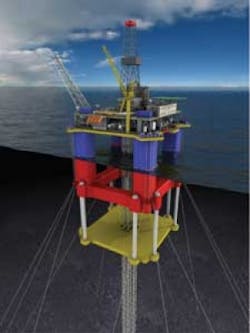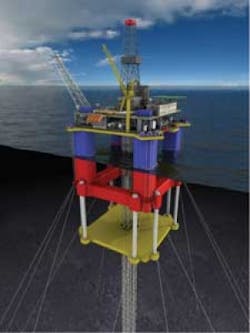ATV expanding valve range and testing capabilities
Since ATV’s formation in early 2006, the company has evolved from a technical engineering services provider to a manufacturer of all types of valves for upstream and downstream applications.
Annual turnover is heading upwards, EU 30 million at the latest count, with 95 personnel employed, including 15 engineering staff. The headquarters is in Colico, 100 km (62 mi) north of Milan, and the company has commercial offices in Paris, Rotterdam, London, Oslo, Houston, Rio de Janeiro, Bogotà, Beijing, Dalian, Kuala Lumpur, Singapore, Perth, Abu Dhabi, Qatar, and Saudi Arabia.
ATV produces a wide range of topside and subsea valves (slab gate, expanding gate, ball valves, check valves, axial flow control valves and check valves, rising stem ball valves, HIPPS valves and others), also making its own subsea actuators. Products can be manufactured in a wide range of alloys and high-strength, corrosion-resistant steels according to industry standards such as ASTM, Norsok, BS, and DIN. Where possible, ATV prefers to use forged materials for the purposes of intrinsic structural soundness.
A 10-in. (25-cm) pig diverter valve, manufactured by ATV.
The factory in Colico, which included a 7,500-sq m (80,729-sq ft) covered area, provides facilities for lifts of up to 70 metric tons (77 short tons). A wide range of test equipment, including seven test rigs of different sizes, can be used to qualify components such as high pressure, large bore valves and subsea actuators to demanding industry standards such as API6A and API17D. All the test rigs fit into underground pits, surrounded by heavy steel walls for safety purposes. Each is equipped with a data-logging system – clients can log on via the Internet to examine data available to the test operator.
Other test facilities in Colico include two hyperbaric chambers of small-medium size which can simulate pressure conditions in water depths of 1,500 and 3,000 m (4,921 and 9,843 ft). The company is currently investing EU 2 million in a third, very large hyperbaric chamber (2,500 mm ID), simulating conditions in up to 4,500 m (14,764 ft) of water. This, it claims will be the world’s heaviest such facility (privately owned), and will be made available to any company for testing subsea equipment, either on a rented basis, or with ATV providing operators, ROV tooling, instrumentation and so on.
ATV has also developed an on-the-spot acoustics emissions apparatus for volumetric, non-destructive testing of a valve’s pressure boundary (body-bonnet), and software to analyze data collected from the sensors. As this testing method may soon become an industry requirement, ATV will be prepared to carry on that test on a routine base.
ATV’s first offshore order was for subsea valves for the Gimboa project offshore Angola. Today the company supplies valves to all main subsea production system providers (Aker, Dril-Quip, GE Vetco Gray), and to pipeline contractors such as Heerema, Allseas, Technip, Subsea 7, Acergy, and Saipem.
Among its recent subsea deliveries were a consignment of large top-entry ball valves – ranging from 14-18-in. (36-46 cm) diameter, ANSI 150 class with forged bodies – for the Statoil- GDF operated Gjoa development in the Norwegian North Sea. ATV was responsible for engineering, manufacturing and qualification of the valves and their helical spine retrievable hydraulic actuators, designed to match Statoil’s proprietary interfaces.
Ongoing projects include:
- Gorgon project off northwest Australia, where qualification of the metallurgy for the pressure-containing components is critical
- Te Giac Trang in the Cuu Long Basin off southern Vietnam (subsea and topsides valves and actuators, including fully-welded side entry and swing check valves)
- Kangean, offshore Indonesia (topside and subsea top entry ball valves, swing check valves and subsea globe valves)
- Kashagan offshore Kazakhstan. Here ATV is supplying a large quantity of ball valves of up to 30-in. (76-cm), designed to withstand severe corrosive conditions (Kashagan’s gas has a > 15% hydrogen sulfide content). The valves have to undergo a fugitive emissions test to prove that they will not leak.
ATV has been qualified as an approved valve supplier by ExxonMobil, and it has also qualified two subsea ball valves according to Petrobras’ strict qualification procedure, with further items currently undergoing qualification. ATV has supplied many subsea ball valves to Petrobras ranging from small-bore HP injection valves to large-bore ball valves.
Offshore Articles Archives
View Oil and Gas Articles on PennEnergy.com

